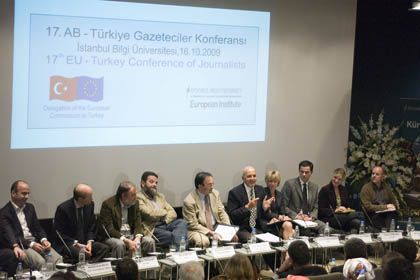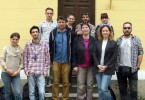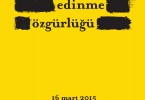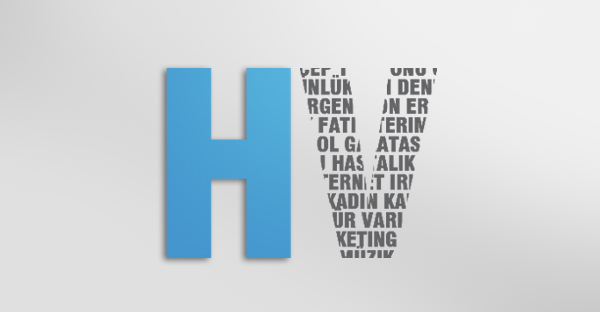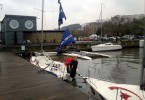Kristin Ofer
Finally this year’s EU Progress Report on Turkey was published on October 14th 2009 but instead of discussing the report’s details the journalists participating in the 17th annual EU-Turkey Conference of Journalists complained about the difficulties to keep people interested in the subject.
Basically the message of the EU report was that there are slight progresses in Turkey but still some work has to be done. The European Commission expressed its appreciation of Turkey regarding the Ergenekon trial stating: “For the first time, illegal networks nested within the democratic institutions are being investigated.” Of course the diplomatic breakthrough between Turkey and Armenia when the foreign ministers of the two countries signed a protocol in Zurich on October 10th to improve their relation was positively mentioned as well. But the commission complained about the shortcomings concerning freedom of press and other civil rights like minority rights, especially for the Kurds, torture, excessive use of force by the Turkish security officials and women’s rights that still need to be improved.
Surprisingly, the participants of the EU-Turkey Conference of Journalists which was held at Istanbul Bilgi University’s Santral campus, did hardly talk about these subjects. Instead of going into the details of the European Commission’s Report Professor Ayhan Kaya, Director of Bilgi University’s EU Institute and Moderator of the panel discussion, asked the European Journalists about the attitudes of their respective countries toward Turkey’s EU admission.
The opening speech was delivered by Istanbul Bilgi University Rector Prof. Halil Guven who was rather critical of EU’s policies. He underlined the fact that EU has accepted “half of Cyprus as full member” while it failed to keep up with its promises for the remaining other half. Prof. Guven said, because of such policies it “is hard to defend EU in Turkey.”
Following Prof. Guven, Turkey’s Minister in Charge of EU and chief negotiator Egemen Bagis addressed the participants saying that if EU really wanted to become a global organization it should accept Turkey as a member. “I cannot think of a European Union that leaves Istanbul outside,” Bagis said.
Then journalists coming from various EU members expressed their views about Turkey’s membership.
John Peet from The Economist said that the British are strongly in favour of a Turkish membership. “Turkey is a very important regional player who can improve the security of the entire region. Concerning the economy I would put Turkey equal to France, Germany and Great Britain,” he explained. Furthermore, Peet emphasized that the British understand well Turkey’s problems to become a member: “We were the first country who received a “Non!” from a French president when Britain wanted to join the EU in 1973,” he said.
His Spanish colleague Bernado de Miguel Renedo from Cinco Dias explained that a major concern of Spain is another increase of the stream of immigrants the country already has to face. “But immigration was not a theme in this year’s election campaigns which is actually a good sign for Turkey,” Renedo pointed out to appease Turkey.
“Is your support for Turkey unconditional?” asked Moderator Kaya the Swedish guest Rolf Gustavsson from Svenska Dagbladet. The answer came immediately: “Of course not, the whole process of the admission is full of conditions! But indeed Sweden is not the problem for Turkey. Our new government is in favour of a Turkish membership.”
As expected Marie Biedermann from the French press agency AFP did not have any good news to tell: “Sarkozy won’t change his position against Turkey’s membership and he has still two more years to go,” the Frencj journalist pointed out.
Her German colleague Michael Thumann from Die Zeit agreed that nothing seems to change for Turkey at the moment, but his point of view was slightly different: “Actually this is good news for Turkey! The privileged partnership, the new government of Angela Merkel’s conservative CDU and Guido Westerwelle’s neo-liberal FDP still favours is not the end of the accession process. It can be as well just a stopover on Turkey’s way to a full membership. But this is up to Turkey itself,” he said.
In contrast to the French and German participants, Greek journalist Evangelos Jean Demiris from Athens News Agency (ANA) had nothing but positive statements to tell the audience from his country: “Our government is in favour of Turkey joining the EU. We have high expectations towards the Relations between Turkey and Greece.” He said that his countryu’s news Prime Minister Yorgo Papandreou’s visit to Turkey just after he won a landslide victory was not just a coincidence and it heralded improved relations between the two countries.
Emil Hurezeanu from Realitatea-Catavencu, one of the two guests from countries that joined the EU in the big accession process of 2007 pointed out that Romania supports Turkey’s admission “The EU can benefit a lot from a Turkish membership, especially from Turkey’s proximity to conflict areas in the Middle East,” he said.
“Poland is a catholic country, so the biggest worry among the population concern Islam in Turkey,” Konstanty Gebert from Gazeta Wyborca tried to explain Poland’s negative attitude towards Turkey.
All the journalists, the Turkish as well as the guests from the EU states were complaining about the problem of the declining public interest in Turkey’s admission to the EU. Cansu Camlıbel who represented Hürriyet in the panel discussion admitted: “We almost gave up on reporting because there is nothing to report.” The participants on the podium and the audience nodded in agreement. Indeed neither the European Commission’s Progress Report nor the journalists at the panel had breaking news on the Turkish case that could make the headlines.
Although State Minister and Chief Negotiator Egemen Bağıs tried to focus on the rather young audience saying: “Seeing this hall crowded with young, interested, open-minded people I am convinced that there is hope for Turkey. This generation can carry Turkey into the European Union.”
But the fact that young, well-educated students who mostly come from Europe for an ERASMUS year in Turkey are not an obstacle to Turkey’s way into the Union is not news either.
It was Murat Belge – the 66-year-old left-liberal columnist of Taraf and co-founder of the publishing company İletişim Yayınları underlined that Turkey’s moving towards democracy is more important than negotiations with EU. “If Turkey is making progress, that will bring us much closer to the EU than negotiations. The country needs to move toward democracy because what we have right now, a military democracy is nothing but an oxymoron,” he said.

